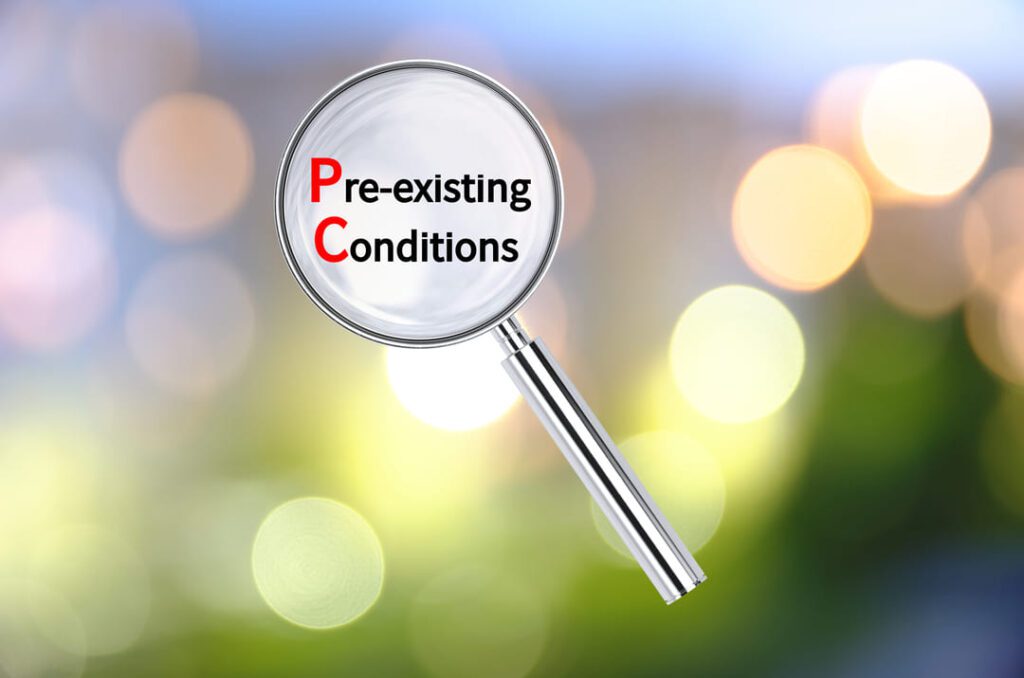Looking for Expert-Level VA Claim Answers?📱Call Us Now! 737-295-2226
VA Service Connection Based on Aggravation
Did you know that if you have a pre-existing condition aggravated by military service, you may be able to get VA disability benefits?
It is an important issue for many veterans, as they may not even realize they could qualify for benefits. Our guide will tell you everything you need to know about service connection based on aggravation of a pre-existing condition.
We want to help every veteran who qualifies for benefits receive them. That’s why we’ve put together this comprehensive guide on how to get VA disability benefits based on a pre-existing condition aggravated by military service.

- VA Service Connection Based on Aggravation
- Examples of a VA Disability Aggravated Condition
- How Does the VA Rate a VA Disability Pre-existing Condition?
- Frequently Asked Questions
- Does the VA Cover Pre-existing Conditions?
- Can the VA Take Away My VA Disability Aggravated Service Connection Disability Compensation?
- What Is a VA Aggravated Claim?
- What Are Genetic Conditions That Can Be Aggravated by Active Duty?
- What if My Service-Connected Disability Gets Worse?
- What Is the 20-Year Rule for VA Disability?
- What Is the Easiest VA Disability to Get?
- What Are the Easiest Things to Claim for VA Disability Compensation?
- How to Establish a Secondary Service Connection to Receive Veterans Disability Compensation Benefits
Pre-existing Condition Aggravated by Military Service
Veterans who develop a pre-existing condition while serving their country often have difficulty getting the disability benefits they need and deserve.
The VA has strict requirements for proving that a condition is service-related, and many veterans don’t have the documentation or medical records necessary to make their case.
However, there are steps that veterans can take to improve their chances of being approved for benefits.
What Is Aggravated by Military Service?
Military service can be a rewarding experience but could affect your physical and mental health.
Long hours, difficult conditions, and the constant stress of being in a combat zone can all lead to physical and emotional injuries. Those with post-traumatic stress disorder (PTSD), depression, or anxiety may find their symptoms aggravated by their military service.
Deployments can last for months or even years, making it difficult to communicate with loved ones. The disruption of regular routines can make it hard to readjust to civilian life after deployment. In addition, military service can put a strain on personal relationships.
How Does the VA Define Aggravation?
The Department of Veterans Affairs (VA) uses the term “aggravation” to refer to an injury or illness made worse by military service.
Section 3.306(a) derives from 38 U.S.C. 1153, which provides that a preexisting injury or disease will be considered to have been “aggravated” by active service “where there is an increase in disability during such service,” unless the increase is due to the natural progress of the disease.
To receive benefits for an aggravated condition, veterans must first establish that they had a pre-existing condition before entering the military.
Once that has been established, the veteran must show that their military service worsened the condition. The VA will consider various factors in determining whether or not a condition has been aggravated by military service, including the nature of the veteran’s duties, the type of environment they were exposed to, and the severity of their symptoms.
If the VA determines that a condition has been aggravated by military service, the veteran will be eligible for treatment and benefits.
Can I Get VA Disability for a Pre-existing Condition?
The answer to this question is “it depends.”
If you were disabled before enlisting in the military, you must provide medical evidence that your service aggravated your condition. It can be difficult to do if you don’t have a clear diagnosis or if your condition has worsened over time.
However, getting disability benefits for a pre-existing condition is possible if you prove that your service worsened it. The best way to do this is to get a medical opinion from a doctor familiar with your medical history. They can give an opinion as to whether or not your condition is service-connected.
Suppose you are unable to get a doctor’s opinion. In that case, you can still submit evidence from your medical records or witnesses who can attest that your condition has worsened since you enlisted.
Ultimately, it will be up to the VA to decide whether or not your claim is valid. However, if you have compelling evidence, there is a good chance that you will be approved for disability benefits.

Examples of a VA Disability Aggravated Condition
Aggravated conditions can make it harder for veterans to work or care for themselves and their families. Some of the most common aggravated conditions include:
Hearing Loss
Anyone who has experienced a hearing loss can attest that it can be a debilitating condition that can significantly impact your quality of life. Hearing loss is also one of the most common VA disability aggravated conditions.
There are several reasons why hearing loss is so common among veterans, but the most common cause is exposure to loud noises. It can include exposure to loud noises during combat and exposure to loud noises while working with heavy machinery or participating in other activities.
Hearing loss can also be caused by head injuries or diseases that affect the ears.
Regardless of the cause, hearing loss can significantly impact a person’s ability to communicate and function in day-to-day life. If you are a veteran with hearing loss, you may be eligible for VA benefits to help you cope with your condition.
Flat Feet
Flat feet are one of the most common conditions leading to a VA disability rating. The condition is also known as pes planus or fallen arches. It occurs when the foot arch collapses, causing the entire foot to come into contact with the ground.
It can cause pain, difficulty walking, and problems with balance and stability. Flat feet are often aggravated by other conditions, such as bunions, hammertoes, and plantar fasciitis.
For many veterans, flat feet can be a disabling condition that impacts every aspect of their lives. Treatment for flat feet typically includes orthotic devices, physical therapy, and custom-made shoes. In severe cases, surgery may be necessary.
Limitation of Flexion Of Leg
A common VA disability aggravated condition is known as Limitation of Flexion Of Leg, or LOFL. This condition typically occurs when an injury to the leg results in a loss of range of motion in the knee or hip joint.
In some cases, LOFL can also be caused by degenerative diseases such as arthritis. Symptoms of this condition can vary depending on the severity of the underlying injury or disease but may include pain, swelling, and difficulty walking.
Treatment for LOFL typically focuses on restoring range of motion and improving mobility. In some cases, surgery may be necessary to correct the underlying problem.
Traumatic Arthritis
Traumatic arthritis is caused by damage to the joints, which can result from traumatic events such as car accidents or falls.
This damage can lead to the deterioration of the joint, which can result in arthritis over time. The symptoms can include pain, stiffness, and swelling in the affected joints. In severe cases, the damage can lead to deformity and immobility.
Traumatic arthritis is a significant problem for veterans, as it can limit their ability to participate in activities they once enjoyed.
Lumbrosacral / Cervical Strain
Lumbosacral or cervical strain is a condition that affects the spine and can cause pain in the lower back, neck, and shoulders. The condition is caused by various things, such as lifting heavy objects, repetitive movements, or accidents.
Treatment for the condition typically includes physical therapy, pain medication, and rest.
Hypertensive Vascular Disease
Hypertensive vascular disease (HVD) is a progressive disorder characterized by high blood pressure and atherosclerotic artery lesions.
The condition can lead to several serious complications, such as heart attacks, strokes, and kidney failure.
Major Depression
Depression is one of the most common VA disability aggravated conditions.
Major depression is a mood disorder that causes a persistent feeling of sadness and loss of interest. Symptoms of Major Depression can include changes in appetite, sleep, energy levels, concentration, and self-esteem.
Major depression can also lead to substance abuse, social withdrawal, and suicidal thoughts. Veterans who suffer from major depression are more likely to experience other mental health disorders, such as anxiety and post-traumatic stress disorder.
In addition, major depression can aggravate physical health problems.
Knee and Other Impairments of the Lower Extremities
Knee and other impairments of the lower extremities are some of the most common conditions that can be aggravated by military service.
The causes of these impairments can vary, but they often include injuries sustained in combat or training, exposure to dangerous chemicals or toxins, and repetitive stress injuries.
Regardless of the cause, knee and other lower extremity impairments can severely impact a veteran’s quality of life. Common symptoms include pain, stiffness, swelling, and reduced mobility. These symptoms can make it difficult to perform basic activities like walking or climbing stairs.
Treatment options vary depending on the severity of the condition but may include physical therapy, medication, surgery, or assistive devices.
For many veterans, knee and other lower extremity impairments are lifelong conditions that require ongoing care and management.
Bronchial Asthma
Bronchial asthma is a chronic lung condition that can be aggravated by environmental factors such as pollution, dust, and smoke.
For many veterans, exposure to these triggers during their military service can lead to the development of asthma or make their existing condition worse.
In addition to respiratory difficulties, asthma can cause fatigue, anxiety, and depression.
The VA provides a variety of treatments for veterans with asthma, including medication, lifestyle counseling, and breathing exercises.
Limited Motion of the Ankle
Limited Motion of the Ankle can be caused by various factors, including injury, arthritis, or even wearing ill-fitting shoes.
Limited Motion of the Ankle can lead to several serious problems, including pain, stiffness, and an increased risk of falls. In severe cases, it can even prevent a veteran from being able to walk or stand.
How Do I Establish My Pre-existing Condition?
There are a few things you can do to establish your pre-existing condition.
- First, you will need to see your doctor and get a diagnosis. You can do it through a physical examination, lab, or imaging tests.
- Once you have a diagnosis, you will need to gather medical records that support your diagnosis. It may include test results, doctor’s notes, or hospital records.
- You will also need to show that you have been treated for your condition in the past. You can do it with prescriptions, medical bills, or insurance claims.
By gathering this information, you can establish your pre-existing condition and get the necessary coverage.

How Does the VA Rate a VA Disability Pre-existing Condition?
If you have a pre-existing condition, the VA will assign a separate disability rating for that condition.
The specific rating will depend on the severity of your symptoms and how well they are controlled.
In general, the VA will give higher ratings to conditions that are more severe or difficult to treat.
The overall disability rating will be based on the combined ratings for all your pre-existing and service-connected conditions.
If you have multiple service-connected disabilities, the VA will use a special formula to calculate your overall rating. This formula considers the severity of each disability and any interactions between them.
Pre-existing conditions can play an important role in determining your overall disability rating, so getting an accurate diagnosis and documenting your symptoms is important.

We hope this guide has been helpful. We’re VA insiders here to walk you through everything you need to know. Remember, if you have any questions, we encourage you to contact us for support.
Frequently Asked Questions
Does the VA Cover Pre-existing Conditions?
The answer to this question depends on the specific condition and the veteran’s eligibility for health care benefits. The VA generally does not provide coverage for pre-existing conditions not caused by military service. However, there are some exceptions.
For example, the VA may provide coverage for a pre-existing condition related to a service-connected disability. Additionally, the VA may provide coverage for a pre-existing condition if it is determined that the veteran requires specialized care unavailable at a non-VA facility.
Can the VA Take Away My VA Disability Aggravated Service Connection Disability Compensation?
The answer to this question is, unfortunately, yes.
The VA can take away your service-connected disability compensation if they decide that your condition has improved to the point where you are no longer disabled. The VA can also downgrade your disability rating if they believe your condition has improved. It can happen even if you have not received any new medical treatment or your treating physician has not indicated that your condition has changed.
If the VA decides to take away or downgrade your disability benefits, you will be given notice and an opportunity to appeal their decision. However, it is important to remember that the appeals process can be long and complex, so it is always best to prevent a reduction in benefits from happening in the first place.
One way to do this is to make sure that you regularly update your VA medical records and provide any new information that may be relevant to your claim.
What Is a VA Aggravated Claim?
A VA aggravated claim (for direct aggravation) is when a veteran’s pre-existing disability is made worse by an event or condition after they left the military.
The VA will provide compensation for any additional problems that are caused by the veteran’s military service, as long as it can be shown that there is a link between the two.
To file a VA aggravated claim, the veteran must have a diagnosis of a pre-existing disability before service. They need to submit evidence such as an Independent Medical Opinion and Nexus Letter that shows that the pre-existing disease was increased due to military service, not due to the natural progression. If the VA determines that the veteran’s pre-existing disability was indeed aggravated by service, they will provide compensation accordingly.
What Are Genetic Conditions That Can Be Aggravated by Active Duty?
There are a variety of genetic conditions that can be aggravated by active duty.
One example is sickle cell anemia, in which the red blood cells are shaped like crescent moons. It can cause problems with blood flow and lead to pain, organ damage, and even death.
Other conditions exacerbated by active duty include hemophilia, von Willebrand disease, and thalassemia. These conditions can all lead to problems with blood clotting, which can be dangerous in a military setting.
In addition, active duty can also aggravate certain auto-immune disorders, such as lupus and rheumatoid arthritis.
These conditions can cause pain, fatigue, and organ damage. As a result, it is important for service members who have these conditions to be aware of the risks and take steps to protect themselves.
What if My Service-Connected Disability Gets Worse?
If your service-connected disability worsens, you may be eligible for an increased rating.
The natural progression of many conditions can cause them to worsen over time, which can be considered when your rating is reviewed. To get an increased rating, you must submit new evidence showing your condition has worsened.
This evidence can come from doctors’ notes, test results, or other documentation. If your claim is approved, your monthly benefits will be increased to reflect your new disability rating.
What Is the 20-Year Rule for VA Disability?
The VA 20-year rule means if your rating has been in effect for 20 years or more, the VA cannot reduce it below the lowest rating it has held for the previous 20 years.
The only exception to this rule is if the VA can prove fraud.
What Is the Easiest VA Disability to Get?
Veterans can receive compensation for various injuries and illnesses, but some conditions are more likely to be approved for benefits than others. One of the easiest types of claims to get approved for is a mental injury occupational disease.
The VA’s well-recognized conditions like post-traumatic stress disorder and depression and a large body of medical evidence support their connection to military service.
Similarly, veterans who suffer from an occupational disease – such as hearing loss or lung cancer – can also easily get approved for benefits. In these cases, the VA will typically presume that the condition was caused by military service, as long as the veteran was exposed to known risk factors.
As a result, claimants who fall into these categories can often get their benefits approved relatively quickly.
What Are the Easiest Things to Claim for VA Disability Compensation?
A wide variety of conditions can qualify, but some are easier to claim than others. A service-connected injury is one of the easiest things to claim for VA disability compensation.
It includes any injury or illness caused or aggravated by military service. It can also include conditions that existed before service but were made worse by military service.
Another easy thing to claim for VA disability compensation is a condition rated disabling by the VA. It means that the veteran is unable to work because of their condition.
Finally, veterans who were war prisoners or experienced severe psychological trauma while in service may also be eligible for disability compensation. These veterans will need to provide documentation of their experience, but they will not need to show how it has affected their ability to work.
How to Establish a Secondary Service Connection to Receive Veterans Disability Compensation Benefits
Veterans can receive disability compensation benefits for certain conditions they acquired during service. These conditions can be either physical or mental.
To receive benefits, veterans must first establish a “service connection.” Evidence shows that the veteran’s condition is related to their military service. There are two ways to establish a service connection: direct and secondary.
Direct service connection is when there is clear and unmistakable evidence that the veteran’s condition is directly related to their time in service. An example of this would be if a Veteran were wounded in combat.
Secondary service connection is when a veteran service-connected disability caused or aggravated another condition not necessarily related to their time in service. An example of this would be if a veteran’s service-connected PTSD caused GERD. GERD can be claimed as a secondary condition.
To establish a secondary service connection, veterans need to provide clear and unmistakable evidence linking the non-service-connected condition to their already service-connected condition.

Brian Reese
Brian Reese is a world-renowned VA disability benefits expert and the #1 bestselling author of VA Claim Secrets and You Deserve It. Motivated by his own frustration with the VA claim process, Brian founded VA Claims Insider to help disabled veterans secure their VA disability compensation faster, regardless of their past struggles with the VA. Since 2013, he has positively impacted the lives of over 10 million military, veterans, and their families.
A former active-duty Air Force officer, Brian has extensive experience leading diverse teams in challenging international environments, including a combat tour in Afghanistan in 2011 supporting Operation ENDURING FREEDOM.
Brian is a Distinguished Graduate of Management from the United States Air Force Academy and earned his MBA from Oklahoma State University’s Spears School of Business, where he was a National Honor Scholar, ranking in the top 1% of his class.



